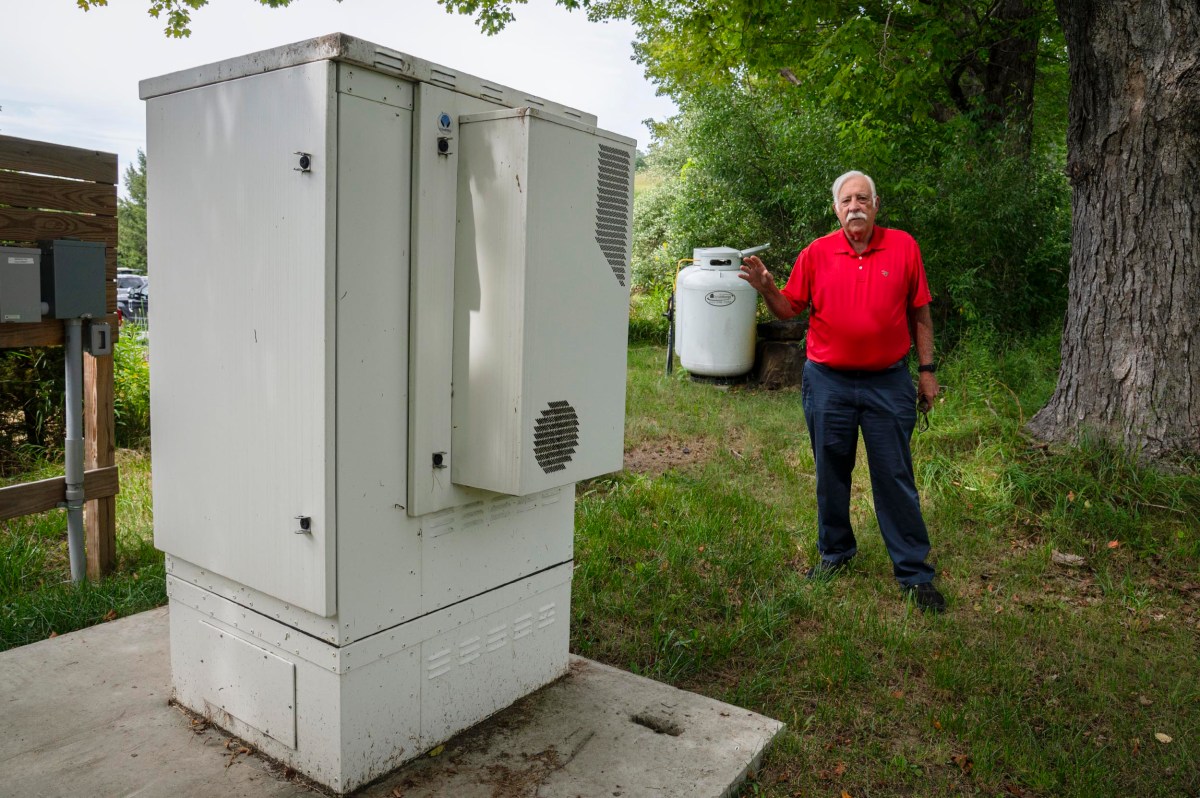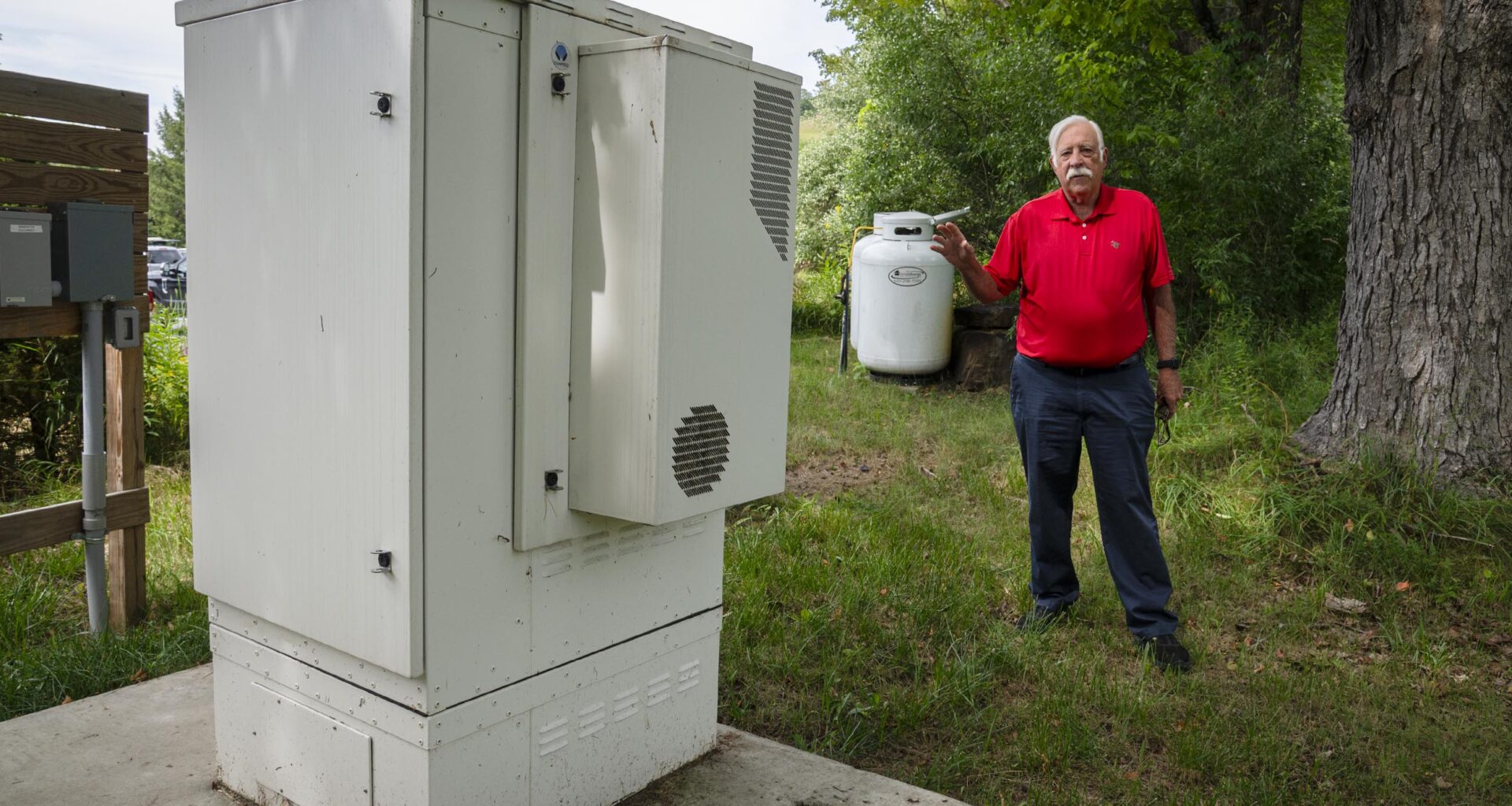 ECFiber board chair F.X. Flinn at one of the communications provider’s hubs in the village of Quechee in Hartford on Tuesday, Aug. 19. The propane tanks in the rear power the hub’s emergency generator. Photo by Glenn Russell/VTDigger
ECFiber board chair F.X. Flinn at one of the communications provider’s hubs in the village of Quechee in Hartford on Tuesday, Aug. 19. The propane tanks in the rear power the hub’s emergency generator. Photo by Glenn Russell/VTDigger
A federal judge has cleared the way for Vermont’s ECFiber broadband network to transition to a new operator, issuing an order aimed at ensuring stability of service for its roughly 10,000 rural customers.
ECFiber and its current operator, Great Works Internet or GWI, have traded several legal blows over their contract in recent months. GWI filed a suit in March against ECFiber board chair F.X. Flinn, accusing him of spying on the company and attempting to poach its employees in a plot to replace it. ECFiber moved for a preliminary injunction in June, seeking to force GWI to comply with a transition policy it said the operator was resisting.
The Aug. 11 decision from Judge Mary Kay Lanthier dictated that GWI must comply with certain transitional measures, but also limited what the communications union district could require of its current operator before the switch to the new provider on Jan. 1. At that time, the Vermont ISP Operating Company, or VISPO — a new nonprofit created by members of ECFiber’s board — will take over the network’s operations.
While GWI is not required to train VISPO employees or share confidential practices, the court ordered the company to provide access to infrastructure and management systems for representatives of the district.
READ MORE
by Habib Sabet
April 11, 2025, 7:31 pmJune 26, 2025, 2:19 pm
Granting the injunction reflects the court’s belief that a smooth transition between operators is crucial to avoid harm to the public, Lanthier’s decision states. For many in ECFiber’s service area, the only alternative to the broadband network would be Digital Subscriber Line — or DSL — internet, which runs along telephone lines and provides much slower speeds for sending and receiving information.
Although the parties to the suit describe the events of the last six months very differently, one thing they all agree on is that it’s expensive to provide internet to rural areas in Vermont. That’s why communications union districts — municipal bodies with the ability to fund fiber network infrastructure — were formed.
“Nobody else is serving them,” said Christine Hallquist, executive director of the Vermont Community Broadband Board, which was created in 2021 to advance the goal of universal, high-quality broadband access across the state.
 Tom Cecere, general manager of GWI Vermont, seen with spools of fiber cable at the ECFiber building in South Royalton on Wednesday, Aug. 20. Photo by Glenn Russell/VTDigger
Tom Cecere, general manager of GWI Vermont, seen with spools of fiber cable at the ECFiber building in South Royalton on Wednesday, Aug. 20. Photo by Glenn Russell/VTDigger
Areas only covered by DSL are considered underserved by the state of Vermont. And even in places where other options exist, some locals say ECFiber is far better than the alternatives.
Holly Lague, the director of libraries in Thetford, said a lack of access to ECFiber’s broadband services would be a “huge hurdle” for the services she provides. Though other providers reach the area, she said she’s heard concerning reports that their services suffer from a lack of reliability and quality.
“I would probably panic,” Lague said.
But Hallquist said the community broadband board had a “high level of confidence” that ECFiber’s network will continue to operate smoothly through the transition, though acknowledged the possibility of “a lot of strain” on staff and board members.
The injunction, Hallquist said, provides a clear path through differences of opinion for the switch to happen.
“The law ruled in favor of ECFiber,” she said. “It really is that simple.”
GWI argued in court that VISPO would not be adequately prepared to step into its new role come January, citing concerns about the new organization’s experience and staffing levels.
Gopi Sundaram, the newly appointed CEO of VISPO, declined to comment on his company’s operational progress. The nonprofit’s board chair, Alessandro Iuppa, said there was “no question in my mind” regarding VISPO’s ability to take on the ECFiber operations.
 A shipment of fiber optic cable is delivered to the Washington Electric Co-op in East Montpelier on April 21, 2022. File photo by Glenn Russell/VTDigger
A shipment of fiber optic cable is delivered to the Washington Electric Co-op in East Montpelier on April 21, 2022. File photo by Glenn Russell/VTDigger
However, S&P Global released a report in May revising ECFiber’s rating outlook to “negative,” based largely on risks associated with the district’s transition to an untested operator.
Scott Sagen, the primary analyst for the report, said the risks lay in the new operator’s lack of experience and an absence of employed staff in May. The outlook revision translates roughly to a 1-in-3 chance that Sagen’s company could downgrade the district’s rating for the municipal revenue bonds it might issue in the future, he said. ECFiber has used this type of bond before to help finance its construction efforts.
“We just felt like the plan change in 2026 could present additional operational challenges that could potentially weaken financial metrics,” Sagen said.
A downgrade wouldn’t be good, Flinn said, but it wouldn’t be an existential threat. The district doesn’t have specific plans to borrow more money in this way at the moment, he said, and when ECFiber issued unrated bonds with a higher interest rate in the past, they made it work financially.
In the Aug. 11 decision, Lanthier wrote that the court could not reasonably draw a conclusion on VISPO’s readiness, and that the court’s focus was ensuring a smooth transition to the new operator.
The decision came during a moment of uncertainty at GWI, during which Mac Mountain, a Vermont-based broadband investment company, exercised warrants for control of the internet service provider.
According to an Aug. 14 Federal Communications Commission filing by Mac Mountain, which holds a controlling interest in GWI, the move was prompted by an “emergency situation.” Several company officers, per the filing, fired a number of senior employees without notice, stopped paying some vendors, and planned to file for bankruptcy, among other actions with which Mac Mountain took issue.
Those officers are no longer employed at the company, said Alex Rozek, CEO of Mac Mountain and owner of GWI. There is also a new board of directors.
Rozek said he had no doubts about the company’s stability. GWI’s former leadership did not respond to requests for comment.
Tom Cecere, a longtime manager at GWI, did not comment on the reasoning behind the decisions of previous leadership.
“It had nothing to do with an immediate cash problem,” he said.
Cecere resigned from his position at GWI in the chaos preceding Mac Mountain’s takeover before returning to work the following week. Now, he said, the financial situation at GWI is stable, even with the impending loss of the ECFiber contract.
The company still has agreements with Northwest Fiberworx and DVFiber, two other Vermont communications union districts.
Rozek said he considers the transition “very risky” for the stability and financial health of the communications district.
In response to criticisms from the district that GWI has an interest in keeping hold of the ECFiber contract, Rozek said the operator’s employees “also all live here, and have a vested interest in having the internet.”
In July, GWI posted an open letter to ECFiber customers detailing concerns around the district’s transparency, and VISPO’s preparedness. Flinn called the operator’s messaging on the transition “a campaign to create fear, uncertainty and doubt.”
Hallquist reaffirmed her confidence in ECFiber’s operation, and said that if it became necessary, her board could step in.
“We will make sure people do not lose service,” she said.

